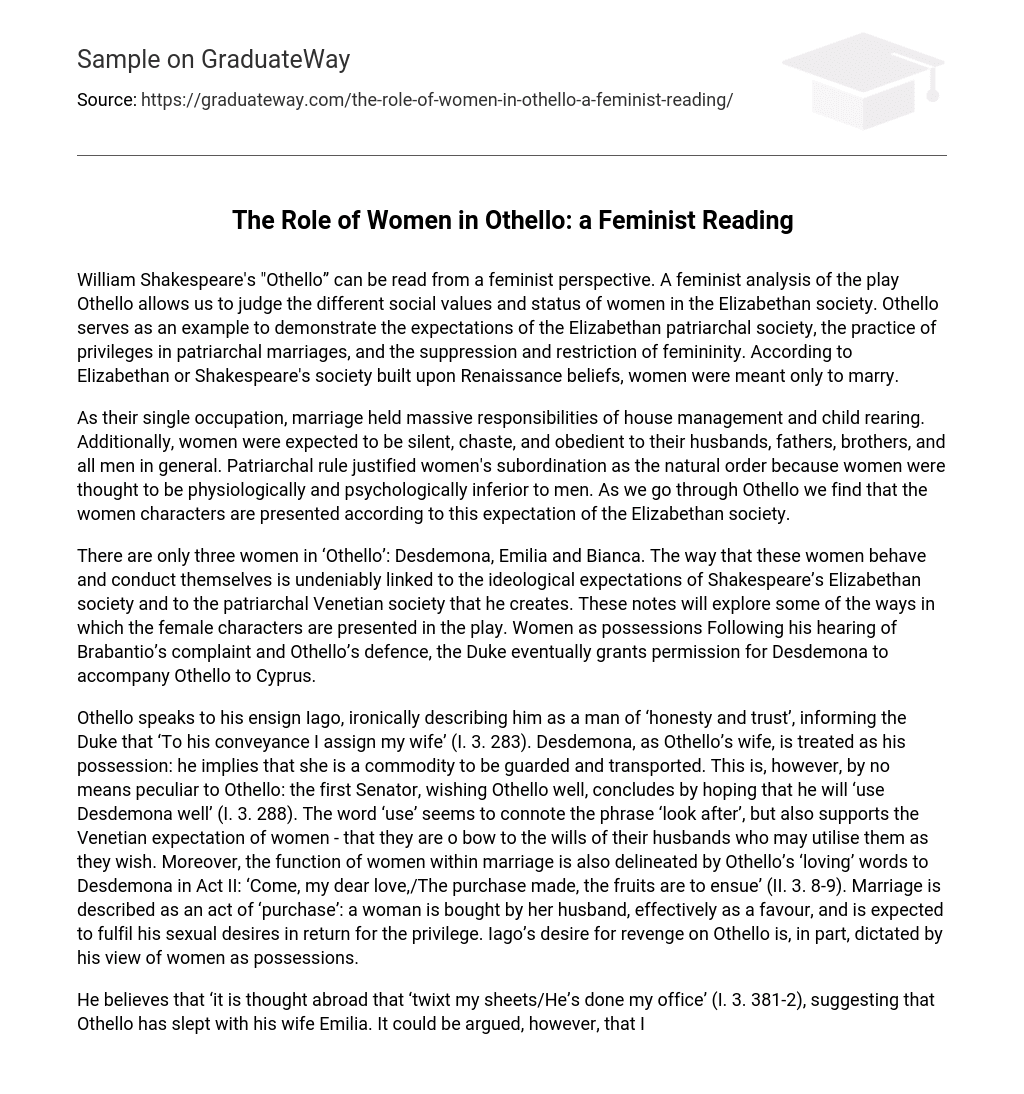By examining “Othello” from a feminist viewpoint, we can see the contrasting social values and roles of women in Elizabethan society. This analysis helps us comprehend the societal expectations for women in a patriarchal system, the privileges men enjoyed in marriage, and the limitations placed on female identity. Consistent with both Elizabethan norms and Shakespeare’s time period, women were mainly expected to fulfill their duties as wives.
In the Elizabethan era, marriage involved responsibilities such as household management and child-rearing. Women were expected to demonstrate submission, virtue, and obedience towards men in their lives—whether it be their husbands, fathers, or brothers. These expectations were based on a patriarchal system that considered women inherently inferior to men in terms of physicality and psychology. The depiction of female characters in Othello reflects these societal norms.
The female characters in ‘Othello’ – Desdemona, Emilia, and Bianca – are influenced by societal expectations of Shakespeare’s Elizabethan era and the patriarchal Venetian society portrayed in the play. This analysis will explore how these women are depicted and discuss the concept of women being regarded as possessions. The Duke decides to let Desdemona go with Othello to Cyprus after hearing Brabantio’s accusations and Othello’s defense.
Othello ironically refers to his ensign Iago as a man of integrity and reliability, informing the Duke that he entrusts his wife to Iago’s care (I. 3. 283). Desdemona, being Othello’s spouse, is treated as his property, implying that she is an object to be guarded and transported. This is not exclusive to Othello; the first Senator also hopes that Othello will treat Desdemona well (I. 3. 288). The term ‘use’ suggests taking care of Desdemona, but it also reinforces the expectation in Venice that women should submit to the wills of their husbands, who can employ them as they please. Furthermore, Othello describes the role of women in marriage in loving terms to Desdemona in Act II, referring to it as a ‘purchase’ where the husband buys his wife and expects her to satisfy his sexual desires in return for the privilege (II. 3. 8-9). Iago’s desire for revenge against Othello is partly influenced by his perception of women as possessions.
He believes that there is a belief that Othello has slept with his wife Emilia, as indicated by the statement ‘it is thought abroad that ‘twixt my sheets/He’s done my office’ (I. 3. 381-2). Nevertheless, it can be argued that Iago does not have much love for his wife, as he insults her in public and ends up killing her himself. The sole thought that drives him mad is that ‘the lusty Moor/hath leaped into my seat’ (II. 1. 286-7), the thought that Othello has taken something that belongs to him.
The fact that Iago refers metaphorically to his wife in two instances, calling her his ‘office’ and ‘seat’, supports the theory that she is objectified and dehumanized. Additionally, in seeking revenge against Othello, Iago wishes to have an equal act done to him by having an affair with Othello’s wife. This displays the disregard for the feelings of Desdemona and Emilia as they are seen as objects to fulfill his own desires.
Although an extreme example, Iago illustrates that in both Elizabethan and Venetian society, women are perceived as possessions subordinate to men’s ambitions. Certain contemporary feminist critics perceive Desdemona as a symbol of oppressed women. Whether this assertion is accurate will be examined later; nevertheless, there is considerable evidence supporting this perspective. Desdemona herself admits, “I am obedient,” and proceeds to comply with Othello’s instructions (III. 3. 89).





